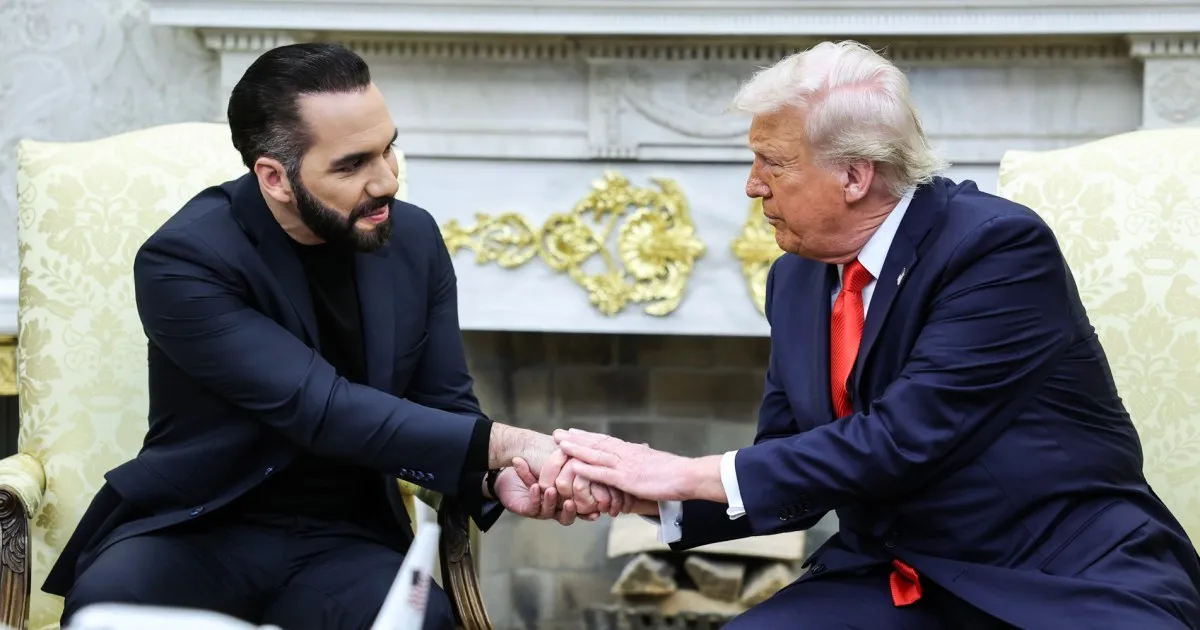
During a recent meeting in the Oval Office with President Donald Trump, El Salvador's President Nayib Bukele faced tough questions regarding the deportation of Kilmar Abrego Garcia, a man the U.S. Justice Department claims was mistakenly sent back to El Salvador. When asked if he would return Garcia, Bukele's response was clear: "How can I return him to the United States? Like if I smuggle him into the United States? Of course, I'm not going to do it. The question is preposterous," he stated. This exchange highlights the complexities surrounding immigration policies and international relations.
President Trump chimed in, emphasizing the absurdity of releasing a criminal into the U.S. by saying, "They'd love to have a criminal released into our country. These are sick people." He further urged Bukele to accept as many deported criminals as possible, a statement that raises questions about the U.S. administration's approach to handling foreign nationals with alleged criminal ties.
According to court filings, Garcia has never faced criminal charges in either the U.S. or El Salvador. The Justice Department admitted that his deportation was a mistake, as a 2019 immigration judge had ordered that he should not be sent back to El Salvador. The Supreme Court has criticized the removal, labeling it illegal and instructing the administration to facilitate Garcia's return while respecting the authority of the El Salvadoran president.
In the Oval Office meeting, Secretary of State Marco Rubio expressed confusion over the conflicting statements regarding Garcia's deportation, asserting, "The foreign policy of the United States is conducted by the president of the United States, not by a court." This comment underscores the ongoing debate about the separation of powers in U.S. foreign policy and immigration enforcement.
Attorney General Pam Bondi stated that if El Salvador wished to return Garcia, the U.S. would facilitate the process by providing a plane. "That’s up for El Salvador if they want to return him. That’s not up to us,” she clarified. This statement suggests a willingness from the U.S. to cooperate, but it also reflects the complicated nature of international deportations.
Shortly after the Oval Office meeting, White House adviser Stephen Miller asserted on Fox News that Garcia was correctly sent to El Salvador, contradicting the Justice Department's claims of an administrative error. “This was the right person sent to the right place,” he insisted, despite the Supreme Court's recent ruling which criticized the deportation.
The U.S. government has recognized that Garcia was subject to a withholding order that prevented his removal to El Salvador, and the Supreme Court highlighted that this removal was indeed illegal. Garcia has been accused of having ties with the notorious street gang MS-13, an allegation he firmly denies. A federal judge presiding over his case, Paula Xinis, pointed out that Garcia has no criminal record in either country and referred to the gang membership charge as based on an "unsubstantiated allegation."
Judge Xinis criticized the evidence presented against Garcia, stating, “The ‘evidence’ against Abrego Garcia consisted of nothing more than his Chicago Bulls hat and hoodie, and a vague, uncorroborated allegation from a confidential informant.” These findings raise serious questions about the validity of the claims made against Garcia and the procedures followed in his deportation.
Miller suggested that if Bukele were to accept Garcia, he would face a second deportation to El Salvador. Meanwhile, the Trump administration has previously negotiated a $6 million deal with El Salvador to imprison deportees identified as members of gangs like Tren de Aragua and MS-13, both labeled as foreign terrorist organizations. The legality and ethics of these agreements continue to be scrutinized as the situation evolves.
This ongoing saga reflects the intricate interplay of U.S. immigration policy, international relations, and the legal challenges facing individuals caught in the system. As the situation develops, it remains to be seen how the U.S. and El Salvador will navigate these complex issues.